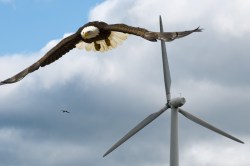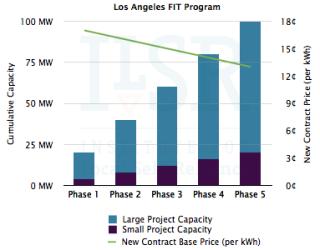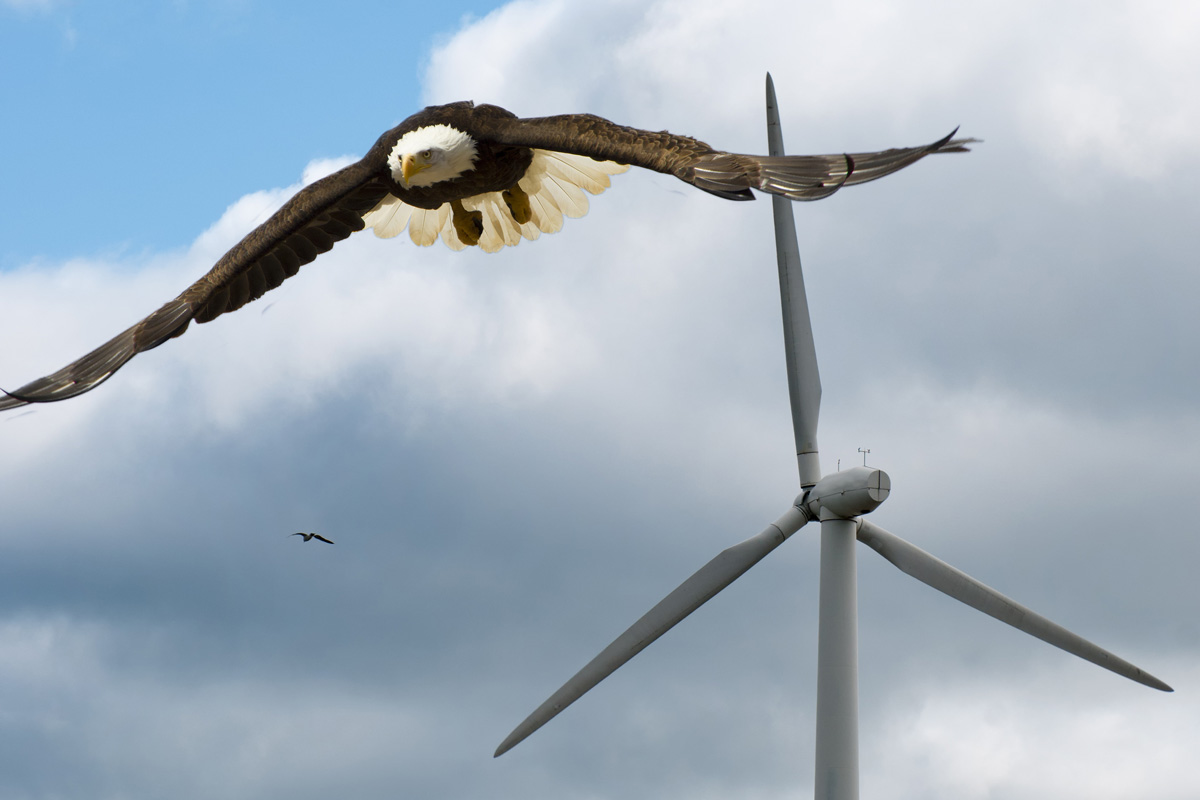
Watch out!
It’s not easy to unite the right-wing Heartland Institute and bird-loving environmentalists.
But that’s what some wind energy developers appear to be doing by proposing to the federal government that they be allowed to kill bald eagles and other protected species with their turbines.
Across the country, 14 wind projects have applied to the U.S. Fish and Wildlife Service for permits that would let them “take” — aka harm or kill — a certain number of eagles each year. That includes four wind farms in California, one in Minnesota, and one in Oklahoma.
The Oklahoma project could be the first in the nation to actually receive such a permit. The company behind it, Wind Capital Group, wants permission to kill up to three bald eagles every year for 40 years on its proposed 94-turbine wind farm. A Native American tribe in the area is protesting, as are some conservation groups. The Daily Ardmoreite reports:
Osage Nation Principal Chief John D. Red Eagle expressed his deep concern and opposition to killing eagles in Osage territory from a cultural standpoint.
“The eagle is a sacred and symbolic figure to the Osage people, and the area targeted for this project contains a high bald eagle population,” Red Eagle said. “While the Osage Nation does not oppose wind energy or alternative energy, we do oppose the specific area for this project. It all comes down to siting projects in appropriate places, and this is not an appropriate place for a massive wind energy project.”
Reuters reports that the Obama administration has been working to loosen wildlife rules to facilitate wind development:
The fight in Oklahoma points to the deepening divide between some conservationists and the Obama administration over its push to clear the way for renewable energy development despite hazards to eagles and other protected species. …
It is illegal to kill bald and golden eagles, either deliberately or inadvertently, under protections afforded them by two federal laws, the Migratory Bird Treaty Act and the Bald and Golden Eagle Protection Act.
In the past, federal permits allowing a limited number of eagle deaths were restricted to narrow activities such as scientific research.
But the Obama administration in 2009 broadened such permitting authority to include otherwise lawful activities like wind power developments.
Now the U.S. Fish and Wildlife Service is seeking to lengthen the duration of those permits from five to 30 years to satisfy an emerging industry dependent on investors seeking stable returns.
As we’ve reported previously, the Obama administration has never prosecuted a wind farm for killing a protected bird, and it recently assured a California wind farm and a luxury real-estate development that they wouldn’t be prosecuted for accidentally killing endangered California condors.
The prospect of eagle “take” permits has angered some folks on the left and on the right — and in between. This despite conditions that would be attached to such permits compelling wind companies to contribute to eagle conservation efforts.
Of course, conservationists and right wingers don’t actually see eye to eye on this issue. The conservationists don’t want bald eagles, golden eagles, or other protected birds to be killed in the name of energy. “If they kill two birds, I think it’s a crime,” Steve Groth of the Minnesota-based Coalition for Sensible Siting told Minnesota Public Radio.
On the other hand, the Heartland Institute, whose funders include ExxonMobil, is opportunistically seizing an excuse to slam a fast-growing alternative to planet-baking fossil fuels.
The wind industry, for its part, says worries about eagle deaths are exaggerated. Again from Reuters:
Fewer than 2 percent of all human-caused deaths of golden eagles occur at modern wind farms and only a few bald eagle deaths have been documented in the history of the industry — far less mortality than is attributed to such causes as poisoning or vehicle collisions, said the American Wind Energy Association spokesman Peter Kelley.
The American Bird Conservancy thinks that birds and wind energy can exist in harmony — it’s just going to take hard work, careful research, and federal regulations. From the nonprofit’s website:
American Bird Conservancy supports wind power when it is bird-smart, and believes that birds and wind power can co-exist if the wind industry is held to mandatory standards that protect birds.
Bird-smart wind power employs careful siting, operation and construction mitigation, bird monitoring, and compensation, to reduce and redress any unavoidable bird mortality and habitat loss. These are issues that the federal government should include in mandatory wind standards.
The bald eagle is a symbol of freedom and an iconic beneficiary of America’s environmental movement, which saved it from extinction by banning DDT and passing laws to protect endangered species. No climate activists would want it to become the new face of opposition to the renewable energy revolution.




